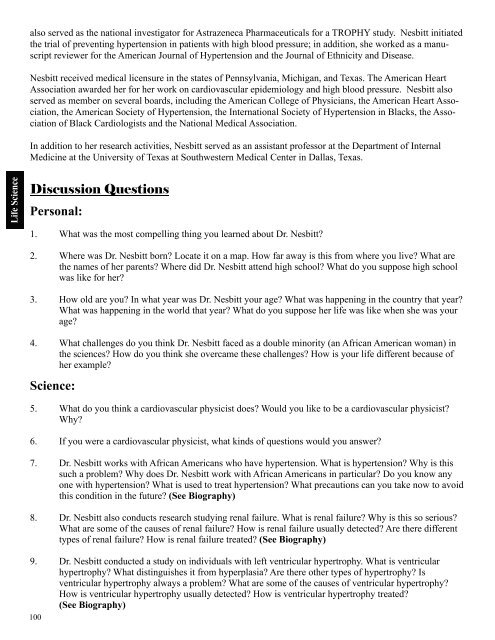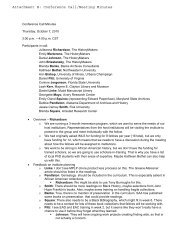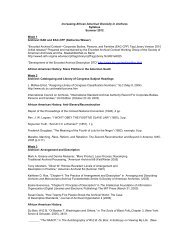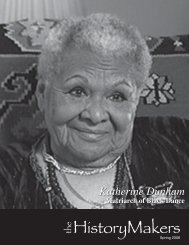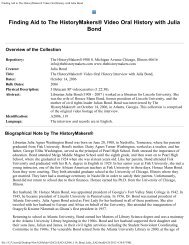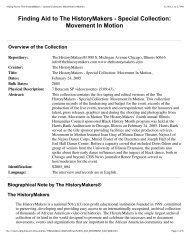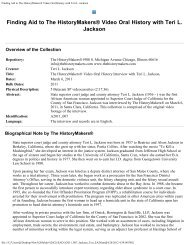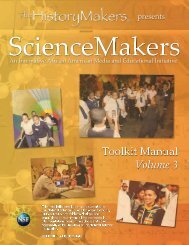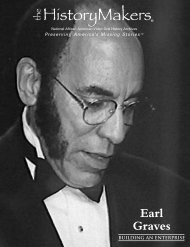ScienceMakers Toolkit Manual - The History Makers
ScienceMakers Toolkit Manual - The History Makers
ScienceMakers Toolkit Manual - The History Makers
Create successful ePaper yourself
Turn your PDF publications into a flip-book with our unique Google optimized e-Paper software.
Life Science<br />
also served as the national investigator for Astrazeneca Pharmaceuticals for a TROPHY study. Nesbitt initiated<br />
the trial of preventing hypertension in patients with high blood pressure; in addition, she worked as a manuscript<br />
reviewer for the American Journal of Hypertension and the Journal of Ethnicity and Disease.<br />
Nesbitt received medical licensure in the states of Pennsylvania, Michigan, and Texas. <strong>The</strong> American Heart<br />
Association awarded her for her work on cardiovascular epidemiology and high blood pressure. Nesbitt also<br />
served as member on several boards, including the American College of Physicians, the American Heart Association,<br />
the American Society of Hypertension, the International Society of Hypertension in Blacks, the Association<br />
of Black Cardiologists and the National Medical Association.<br />
In addition to her research activities, Nesbitt served as an assistant professor at the Department of Internal<br />
Medicine at the University of Texas at Southwestern Medical Center in Dallas, Texas.<br />
Discussion Questions<br />
Personal:<br />
1. What was the most compelling thing you learned about Dr. Nesbitt?<br />
2. Where was Dr. Nesbitt born? Locate it on a map. How far away is this from where you live? What are<br />
the names of her parents? Where did Dr. Nesbitt attend high school? What do you suppose high school<br />
was like for her?<br />
3. How old are you? In what year was Dr. Nesbitt your age? What was happening in the country that year?<br />
What was happening in the world that year? What do you suppose her life was like when she was your<br />
age?<br />
4. What challenges do you think Dr. Nesbitt faced as a double minority (an African American woman) in<br />
the sciences? How do you think she overcame these challenges? How is your life different because of<br />
her example?<br />
Science:<br />
5. What do you think a cardiovascular physicist does? Would you like to be a cardiovascular physicist?<br />
Why?<br />
6. If you were a cardiovascular physicist, what kinds of questions would you answer?<br />
7. Dr. Nesbitt works with African Americans who have hypertension. What is hypertension? Why is this<br />
such a problem? Why does Dr. Nesbitt work with African Americans in particular? Do you know any<br />
one with hypertension? What is used to treat hypertension? What precautions can you take now to avoid<br />
this condition in the future? (See Biography)<br />
8. Dr. Nesbitt also conducts research studying renal failure. What is renal failure? Why is this so serious?<br />
What are some of the causes of renal failure? How is renal failure usually detected? Are there different<br />
types of renal failure? How is renal failure treated? (See Biography)<br />
9. Dr. Nesbitt conducted a study on individuals with left ventricular hypertrophy. What is ventricular<br />
hypertrophy? What distinguishes it from hyperplasia? Are there other types of hypertrophy? Is<br />
ventricular hypertrophy always a problem? What are some of the causes of ventricular hypertrophy?<br />
How is ventricular hypertrophy usually detected? How is ventricular hypertrophy treated?<br />
(See Biography)<br />
100


